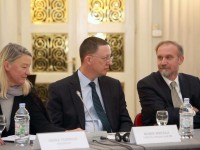“Strengthening the Independence of the Judiciary and the Rule of Law”

On 11 December, a round table on the occasion of the International Anti-corruption Day, titled “Strengthening the Independence of the Judiciary and the Rule of Law”, was held at the "Journalist's home" in Zagreb, organized by Documenta – Centre for dealing with the past, and supported by the Embassy of the United States of America in Croatia.
The speakers on the round table were Vesna Teršelič, Head of Documenta; Marin Mrčela, Head of the GRECO (The Group of States against Corruption), Council of Europe’s monitoring body to fight corruption and judge of the Supreme Court of the Republic of Croatia who presented the major findings of the 2016 GRECO Report with special focus on situation in the Republic of Croatia; Dražen Jelenić, leader of the Republic of Croatia’s Delegation to the GRECO (The Group of States against Corruption) and first deputy to the State Attorney of the Republic of Croatia who made an overview of the results of the “Evaluation of quality of services within the Judicial System in 2016", while Željko Šarić, President of the Judicial State Council and judge of the Supreme Court of the Republic of Croatia and Vedrana Šimundža-Nikolić, Deputy Minister of Justice, offered their views on the Croatian judiciary.
"Citizens may be dissatisfied with the Croatian judiciary, but it is a reflection of the society in which we live in, and how the society as a whole advances, so does judiciary”, said Dražen Jelenić, the first deputy of the State Attorney of the Republic of Croatia, adding that this fact is also supported by recommendations of the expert body of the Council of Europe for Combating Corruption (GRECO).
“As for the judiciary, there is a lot of work, there is a vision, but unfortunately, one of GRECO's important recommendations is not fulfilled - improving the quality of communication between the judiciary and the public, which would show the good things, and there are many good things going on”, he said.
The basis for the discussion of the round table, was a survey from 2016 made by Ipsos Plus Agency, according to which 68% of citizens have a generally negative opinion of the functioning of the judiciary, 59% of them have no confidence in the courts and 40% believe that corruption is widened in judicial institutions.
Marin Mrčela, judge of the Supreme Court and President of GRECO, stressed that research on perception of the judiciary should be taken with the reserve, citing the research of Transparency International in which 74 percent of respondents answered that they believe the judiciary is corrupt, but only 3 percent knows someone who has given a bribe.
In his opinion, the reasons for the negative perception of the judiciary in the public are the length of proceedings sometimes extending for several decades, the individual decisions of judges causing public scandal although they are first-degree decisions, as well as statements of politicians who often criticize the judiciary.
The reason also lies in the media that often unprofessionally report about some cases or publish unverified information, such as those of 20 corrupt judges in the report the Central Intelligence Agency, Mrčela said.
“I am not saying that the situation is fabulous, it has to be much better and there is still a lot to do. However, many good things are not covered by the media”, he said.
Deputy Minister of Justice Vedrana Šimundža-Nikolić pointed out that the negative perception should not be ignored, but taken as a starting point for improving the image of the judiciary.
Documenta – Centre for dealing with the past.



